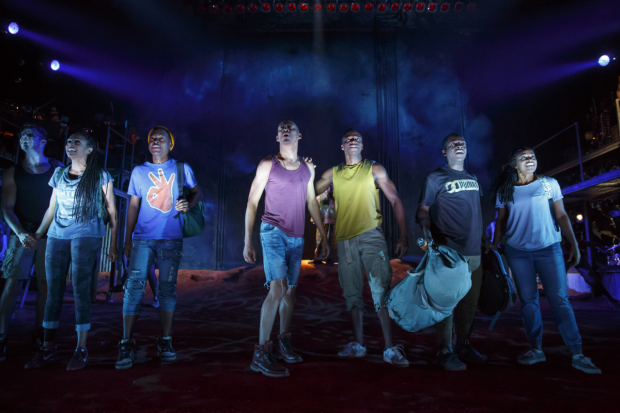Invisible Thread
Second Stage Theatre presents a new musical about young gay Americans in Uganda.

(© Joan Marcus)
A fascinating play is itching to break free from Invisible Thread, Matt Gould and Griffin Matthews' well-meaning yet confusingly executed new musical about American twentysomethings trying to make a difference in Africa. Formerly titled Witness Uganda (when it made its world premiere at A.R.T. in Cambridge), it is now making its New York debut at Second Stage Theatre. It sometimes feels like a musical college essay, the type in which an applicant waxes philosophical about the very important lessons he learned volunteering for a summer in the developing world. Still, the music is tuneful and the book touches on some vital issues, if only slightly.
Based on Matthews' real experience in Uganda, the story follows Griffin (Matthews, convincingly portraying himself), a 23-year-old unemployed actor frustrated by his dim prospects in New York City. He decides to travel to Uganda, where he'll help build a school. "I wanted to feel good about my life," says Griffin, admitting his somewhat self-serving motives. He lives on Pastor Jim's compound with Joy (Adeola Role) and Jacob (Michael Luwoye). When he wanders off one day he meets a group of local teenagers: Ronny (Tyrone Davis Jr.), Grace (Kristolyn Lloyd), Eden (Nicolette Robinson), and Ibrahim (Jamar Williams). Since they are orphans with no access to education, Griffin decides to start a makeshift school in order to teach them well and let them lead the way to a more fulfilling life.
While he's playing Anna Leonowens in Uganda, Griffin's boyfriend, Ryan (the handsome Corey Mach), stays in New York, trying to get his career as a musical theater composer to take off. Sounding very much like a less interesting version of Roger from Rent, he sings of his frustration to find material with the following somewhat tortured lyrics:
The only thing I have to draw upon
Is having a suburban upbringing
I can hear the chorus singing
'Bout white people trouble
Right here in river city
See, it's already been done
I want the nitty-gritty.
Naturally, he packs his bags and joins his boyfriend in nitty-gritty Uganda. Clad in skinny jean shorts and revealing American Apparel tank tops (authentic costumes by ESosa), they traipse around one of the most virulently homophobic countries on earth in their pursuit of purpose and musical content.
Invisible Thread excels at throwing our relatively negligible problems into stark relief when compared with the massive obstacles facing the Ugandan kids. Ryan practically turns green with envy when he sees Jacob flirt with Griffin; it's hard not to roll your eyes at him when he's the one with the American passport. Ryan's musical-theater naval-gazing is not nearly as interesting as Jacob's abusive living situation on the compound, yet they're given equal time. So much of this show is about privilege: to have an education, to have a safety net, to jet off to a foreign country without doing the least bit of research.
"We all want that chance," Eden sings in one of the most moving passages of the show (touchingly conveyed by Robinson). While her new American friends get multiple opportunities to "find home," she barely has a home. It's hard not to feel for her. One wonders if our world can persist in such massive wealth disparity when air travel and the Internet have made the global rich and global poor more accessible to each other than ever.
This timely musical guilt-trip is set to Gould and Matthews' melodious score, an array of driving anthems and soulful ballads reminiscent of Jonathan Larson and early Jason Robert Brown. There's even a perfunctory gospel number, belted out by the superhuman Melody Betts in the one showstopping performance of the evening.
Other than that, the cast rarely slows to catch its breath in director Diane Paulus' frenetic staging. Scenes blend into one another, with multiple points of action onstage. This turns out to be a wise decision, allowing the show to cover a lot of ground in just over two hours. Tom Pye's scaffolding set facilitates this efficiently, leaving plenty of open space for Sergio Trujillo and Darrell Grand Moultrie's energetic African choreography. Any haziness in time or place is readily alleviated by Peter Nigrini's useful projections. Paulus has marshaled the design team and the ensemble into a seamless force, driving the story forward at every moment.
The one other standout performance of the evening comes from Adeola Role as Joy. An ancillary character through most of the show, Joy delivers a late monologue that brings the context full-circle and smacks us upside the head with it. Her story could be a play unto itself. Unfortunately, her difficult-to-hear message is somewhat incongruous with Invisible Thread's feel-good anthems and soaring power ballads. After her illuminating moment, the show leaves us with what feels like a hastily constructed musical false epiphany. Sadly, not every story is best served by the conventions of the American book musical.









